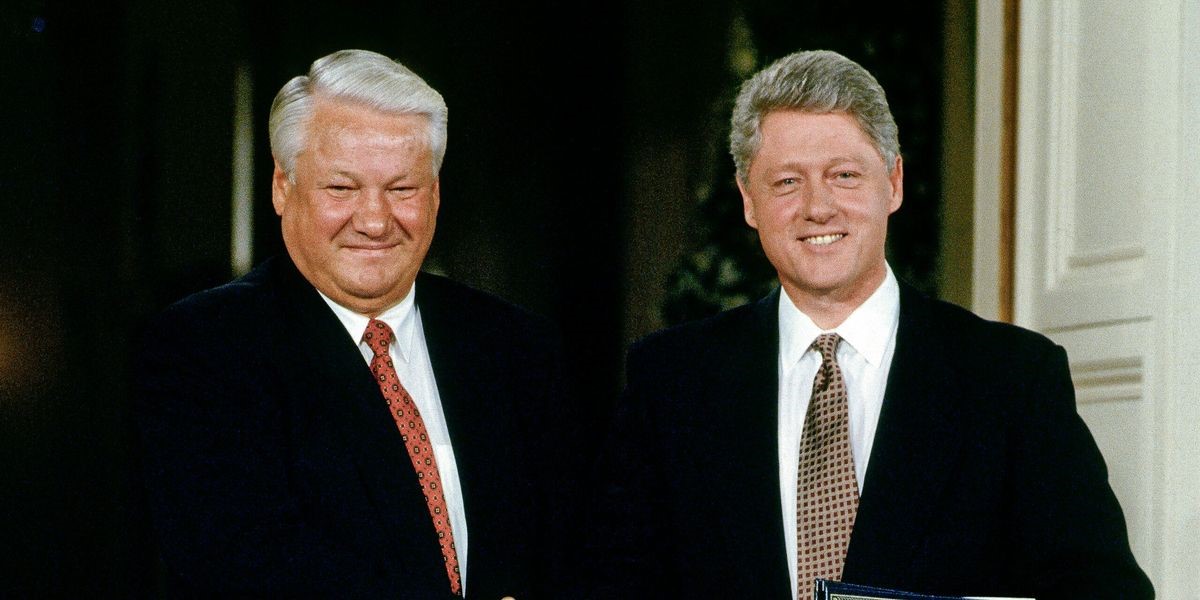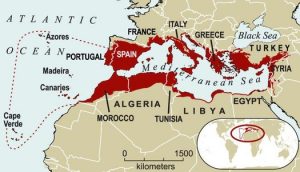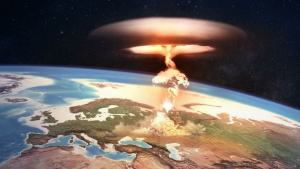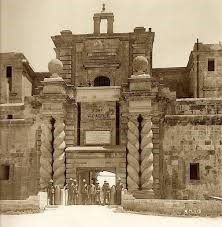Declassified U.S. government documents and Russian declassified documents detail the Russian objections that NATO expansion would (1) threaten Russian security, (2) undermine the idea of inclusive European security and (3) draw a new dividing line across Europe.
U.S. diplomat James Collins, warned Secretary of State Christopher Warren in October 1993, that the NATO issue “is neuralgic to the Russians. They expect to end up on the wrong side of a new division of Europe if any decision is made quickly. No matter how nuanced, if NATO adopts a policy which envisions expansion into Central and Eastern Europe … it would be universally interpreted in Moscow as directed against Russia and Russia alone ….”
At a luncheon meeting with the heads of state of Poland, Hungary, Slovakia and the Czech Republic on 12 January 1994
Poland’s Lech Walesa urges US President Bill Clinton to seize the moment while Russia is weak. He tells Clinton: “Russia had signed many agreements, but its word was not always good: one hand held a pen; the other a grenade.” At the same meeting Walesa emphasizes that the Visegrad countries “had a Western culture. Russia did not.” But Czech Republic’s Vaclav Havel quickly expresses concern that it is not “possible or desirable to isolate Russia.”
After this meeting, ‘in his prepared remarks at the press conference in the Prague Castle, Clinton declares: “now the question is no longer whether NATO will take on new members, but when and how.”
Despite this, Yeltsin is still hoping that instead of enlarging NATO, the US works to strengthen the Organization for the Cooperation and Security in Europe (OCSE). On 6 December 1994 he wrote to Clinton that Russia saw the institutionalization of OSCE as a major step toward making it a “full-fledged all-European organization with a sound legal basis,” and the main structure dealing with security and peacekeeping in Europe. This organization included all the aspiring NATO candidates as its members, as well as the United States and Russia on an equal basis. The expansion of NATO would divert energy and attention from the all-European project.
On December 5, Yeltsin lashed out about NATO at the Budapest summit of the CSCE, addressing Clinton: “Why are you sowing the seeds of mistrust? … Europe is in danger of plunging into a cold peace …. History demonstrates that it is a dangerous illusion to suppose that the destinies of continents and of the world community in general can somehow be managed from one single capital.”
When Clinton visited Moscow in May 1995 to mark the 50th anniversary of victory over Hitler in World War II, Yeltsin told him: “I see nothing but humiliation for Russia if you proceed …. Why do you want to do this? We need a new structure for Pan-European security, not old ones! …. But for me to agree to the borders of NATO expanding towards those of Russia – that would constitute a betrayal on my part of the Russian people.”
Clinton assured Yeltsin, “I won’t support any change that undermines Russia’s security or redivides Europe.”
“A tragic mistake”
Despite this assurance, Czechia, Hungary and Poland were invited to begin accession talks at NATO’s Madrid Summit in 1997 and on 12 March 1999 they became the first former members of the Warsaw Pact to join NATO.
On 31 January 1997 Russia’s new Foreign Minister, Evgeny Primakov prepared a memo stating Russia’s “invariably negative” position toward NATO expansion, especially to the extension of NATO’s military infrastructure to the East. He stressed that NATO expansion was not at the moment perceived as a military threat, but as an “establishment of new dividing lines in Europe,” which would inevitably lead to “ a slide into a new confrontation, undermining of trust between Russia and the Western States.” He referred to the assurances that were given to Soviet and Russian leaders in 1990-1991 that NATO would not expand “an inch to the East.”
Primakov concludes rather forcefully: “We are talking about a decision, consequences of which will define the European configuration for decades in the future. Politicians who are in power today will bear historic responsibility [for that].”
On 10 February 1990 Chancellor Helmut Kohl had told Soviet President Mikhail Gorbachev: “We believe that NATO should not expand the sphere of its activities … I correctly understand the security interests of the Soviet Union.”
On 6 May 1991 French President Francois Mitterand told Gorbachev that NATO’s expansion towards the USSR “… would strengthen the feeling of isolation and even encirclement on the part of the Soviet Union. I am convinced that this road is not right for Europe.”
George Kennan, the architectof America’s containment policy during the cold war, warned, in a May 1998 New York Times interview about Nato’s first round of expansion: “I think it is the beginning of a new cold war … I think the Russians will gradually react quite adversely and it will affect their policies. I think it is a tragic mistake. There was no reason for this whatsoever. No one was threatening anybody else.”
But US and Nato leaders proceeded with new rounds of expansion. The last reasonably friendly warning from Russia that the alliance needed to back off came in March 2007, when Russian President Vladimir Putin addressed the Munich Security Conference: “Nato has put its frontline forces on our borders,” Putin complained. Nato expansion “represents a serious provocation that reduces the level of mutual trust. And we have the right to ask: against whom is this expansion intended? And what happened to the assurances our western partners made after the dissolution of the Warsaw Pact?”
Adapting the conclusion of Robert Frost’s famous poem “The Road Not Taken”:
“I shall be telling this with a sigh / Somewhere ages and ages hence: / Two roads diverged in a wood,
(we could insert ‘and the US and the EU took the road of NATO enlargement and not of the common European security’)
“ …And that has made all the difference”.
Times of Malta 12 September 2025




